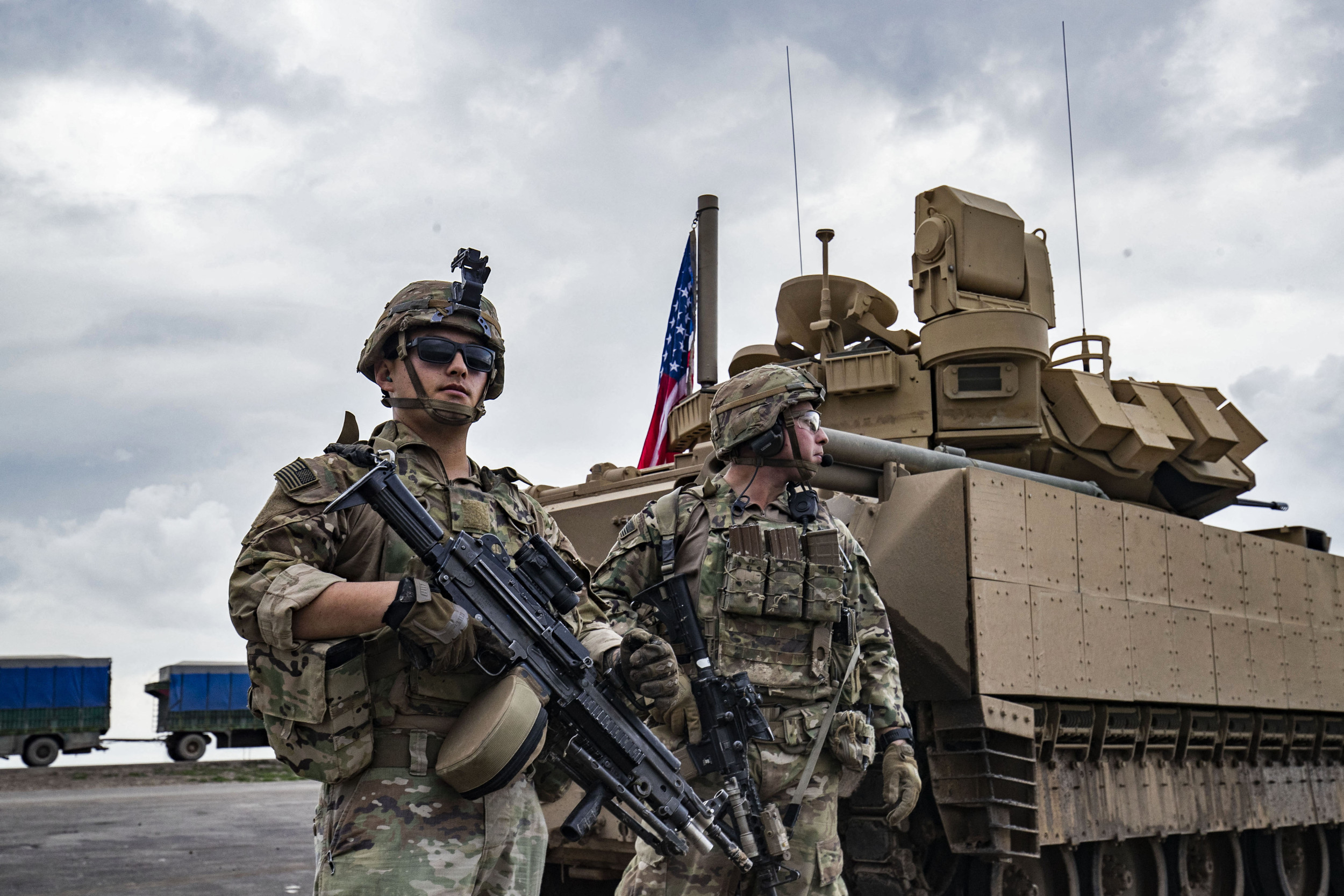U.S. troops stationed across the Middle East are on the lookout for Iran’s regional network of allied militias potentially opening new fronts in the most serious flare-up of Israeli-Palestinian violence in decades.
“We are monitoring across the region for any indicators or warnings that these groups would consider piling on or entering this conflict in a way that escalates it,” a spokesperson for U.S. Central Command (CENTCOM) told Newsweek.
This is why, according to the spokesperson, “we adjusted our posture.”
One day after the surprise land, air and sea attack led by the Palestinian Hamas movement against Israel on Saturday, Defense Secretary Lloyd Austin announced new military moves designed “to bolster regional deterrence efforts.” This included the deployment of the USS Gerald R. Ford Carrier Strike Group to the Eastern Mediterranean and boosting supplies of equipment and resources to the Israel Defense Forces (IDF).
The CENTCOM spokesperson declined to divulge “specific force protection measures or future operations,” but affirmed that “we remain concerned about Iranian supported militia groups and that we continue to take appropriate measures to ensure the security of U.S. military personnel.”
As of January 2022, one year into President Joe Biden‘s tenure in office, the U.S. had more than 30,000 troops in the Middle East, including roughly 2,500 in Iraq and 900 in Syria. The latest data provided by the Pentagon‘s budget request submitted in March for fiscal year 2024 show the number of troops supporting operations in these two countries rose from 3,400 in fiscal year 2022 to 3,949 in fiscal year 2023 with a request to draw down to 3,558 in the coming fiscal year.
Iraq and Syria have hosted Iran-backed militias that have occasionally targeted U.S. troops, drawing U.S. airstrikes on the groups’ positions on several occasions under Biden and his predecessor, former President Donald Trump.
While no attacks have compared to the comprehensive operation launched by Hamas on Israel over the weekend, militias with suspected links to Iran in Iraq and Syria have at times conducted multifaceted attacks of their own involving rockets, drones and small arms fire.
A number of these mostly Shiite Muslim militias, such as Asaib Ahl al-Haq, Kataib Hezbollah, Kataib Hezbollah al-Nujaba and Kataib Sayyid al-Shuhada, all based in Iraq but known to be active in Syria as well, have expressed ardent support for Hamas and have even weighed joining in the fight, potentially by taking aim at U.S. personnel over their military presence in the two countries as well as for their support for Israel.
Iraqi militias have a long history of targeting U.S. troops, dating back to the aftermath of the U.S.-led invasion of the country two decades ago, when rival Sunni and Shiite Muslim militias mobilized against one another and U.S. personnel. When the Islamic State militant group (ISIS) emerged from the instability, Iran intensified its backing of friendly forces to take on the jihadis and aid Syrian President Bashar al-Assad in his war against them and an array of other largely Sunni Muslim insurgent groups.
This intervention initially alienated Sunni Muslim Hamas, but the Palestinian movement has since bolstered ties with Iran and its allies under the common aim of opposing Israel.
Tehran, too, has praised Hamas’ recent surprise attack and the Iranian Mission to the United Nations told Newsweek on Wednesday that the Islamic Republic had provided Palestinian fighters with the “skills” that helped them to conduct such a devastating operation. And while Hamas’ representative in Lebanon told Newsweek later that same day that the group was in active coordination with Iran and other “Axis of Resistance” forces “before, during and after this battle,” the Iranian Mission denied that Iran had any direct role in it.
U.S. and Israeli officials have said they saw no clear evidence of Iran’s involvement in the Hamas attack.
The Iranian Mission previously denied to Newsweek that it was behind militia attacks against the U.S. in Iraq and Syria, though Iranian officials have called troops to be expelled from the two countries. The Syrian government, still firmly under Assad’s control, has also repeatedly demanded that the U.S. withdraw.
The Syrian leader spoke with his Iranian counterpart Ebrahim Raisi during a call Thursday in which they affirmed their joint support for Palestinians now facing a largest-ever Israeli bombing campaign against the Gaza Strip and called for Arab and Muslim unity against Israel.
As the regional fallout of Hamas’ attack and Israel’s still-unfolding campaign against Gaza continues, the CENTCOM spokesperson noted that the U.S. was taking a multi-pronged approach to shoring up deterrence.
“What we’re doing across the U.S. government is, one, flooding the zone with high-level phone calls and engagement to make clear our desire to contain this conflict, support the defense of Israel,” the spokesperson told Newsweek. “So, we are postured in monitoring, for any adversary, that would consider entering this conflict and escalating it.”
This is a developing news story. More information will be added as it becomes available.

